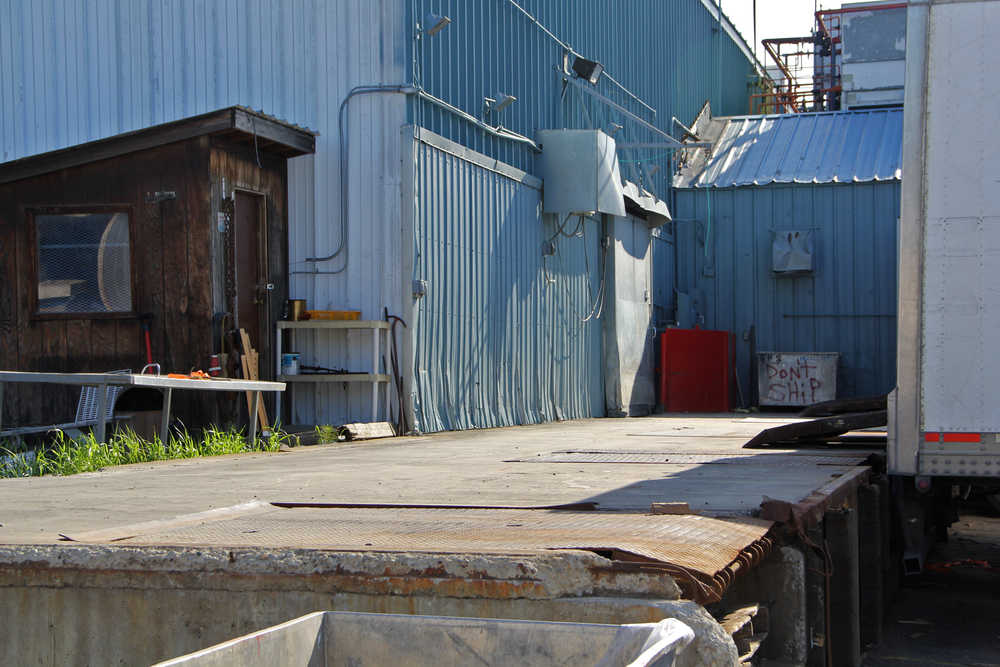Several industry sources and a former plant manager have confirmed that the seafood processor Great Pacific Seafoods has shut down its Alaska operations.
Representatives from the company had not returned calls for comment as of press time, but Nick Barrie, former Kenai plant manager, confirmed the plant will not operate for the summer.
Barrie said he found about a month ago from the company’s headquarters in Seattle.
“Yeah, I was sort of surprised,” he said.
The facility at the end of Cannery Road in Kenai is quiet now, with only Barrie living there. He isn’t sure what will happen — he said the company is filing for bankruptcy and its assets will be sold.
The company’s bankruptcy filings were not available on the electronic federal bankruptcy court system, and an employee in the Western Washington U.S. Bankruptcy Court office could not locate the documents Wednesday. Other industry sources have confirmed the bankruptcy and plant closures.
The Seattle-based seafood processor operated plants in Anchorage, Kenai and Whittier and had previously run buying operations in Kotzebue and Homer, employing approximately 300 people statewide during the peak of fishing season, according to a 2015 report from the Alaska Salmon Alliance. The Kenai plant employed 70-90 people from mid-May to August. The company pulled out of Kotzebue last year, according to the 2015 commercial fisheries season summary from the Alaska Department of Fish and Game.
Barrie said Great Pacific Seafoods could not obtain the capital necessary to start up this season. Low salmon prices in the 2015 season hurt the company, he said.
“The best we were able to do was cut the heads off and take the guts out and get someone to buy them,” Barrie said.
Arni Thompson, a consultant with the Alaska Seafood Alliance, which represents seafood processors, said low salmon prices last year likely contributed to the closures. He said another company may snap up the company’s assets in Alaska.
“This is a temporary or interim setback because the plants are strategically located for the processing and shipment of … iced fish by truck and down to the Lower 48 and air cargo both to domestic and international or foreign countries,” Thompson said.
Capital is a problem for smaller processors due to market conditions. Processors have faced lower wholesale prices for sockeye salmon, a stronger U.S. dollar damaging overseas markets and a Russian import ban on U.S. and Norwegian seafood products, according to a 2015 analysis from the Juneau-based research firm the McDowell Group. A high U.S. dollar is bad for salmon processors, who rely on export markets for the majority of their sales, according to an Alaska Seafood Marketing Institute 2016 bulletin.
Great Pacific Seafoods took a hit last season and could not raise capital for this season, Barrie said.
Small sockeye salmon sizes in Cook Inlet last season hurt many processing companies of all sizes, said Paul Dale, owner of processing company Snug Harbor Seafoods. Larger companies with more capital available may be able to offset their losses more easily, he said.
“I think there was widespread losses in the seafood industry among processors that are involved in salmon, and I think that’s true regardless of size,” Dale said. “I do think that the much larger size companies are always in a better position to weather an adverse year than a smaller company. They simply have greater resources to lean on.”
Things may brighten in 2016. The Alaska Seafood Marketing Institute predicts the smaller expected harvest this season will probably result in a lower overall resource value. Total exvessel value will possibly rebound by 2017. Dale said the closure of Great Pacific Seafoods is a sad event, but in light of a tightening market, makes sense.
David Martin, president of the United Cook Inlet Drift Association, said the Cook Inlet drift gillnet fishermen in Great Pacific Seafoods’ fleet will look for another processor to sell to, as they have done in the past. He attributed the closure in part to restrictions to the drift gillnet fishery in Cook Inlet in 2015. Fish and Game restricted drift gillnet fishermen to particular areas of Cook Inlet and the fishermen could not harvest a large portion of the sockeye salmon last year, Martin said.
“(Great Pacific Seafoods) was just one of many processors left in the (Cook) Inlet that are left that’s trying to make a go of it because the management plan doesn’t allow them to process enough fish,” Martin said.
Records show the sockeye harvest did decline in 2015. Upper Cook Inlet commercial fishermen harvested approximately 23 percent fewer fish than the 1966–2014 average annual harvest in 2015, with an exvessel value of approximately 8 percent less than the 1966–2014 average, according to Fish and Game’s Upper Cook Inlet Commercial Fisheries Annual Management Report for 2015. Fish and Game estimated the price paid for sockeye was $0.65 less per pound than the previous two years, lowering the total exvessel value, according to the report.
Reach Elizabeth Earl at elizabeth.earl@peninsulaclarion.com.


